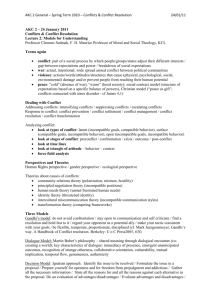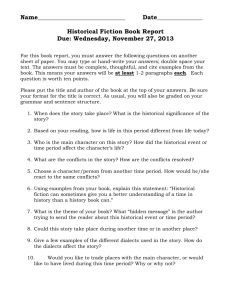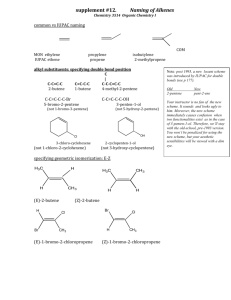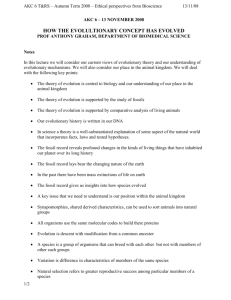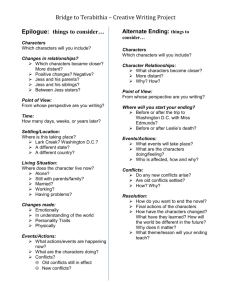Lecture 1: Conflict - King`s College London
advertisement
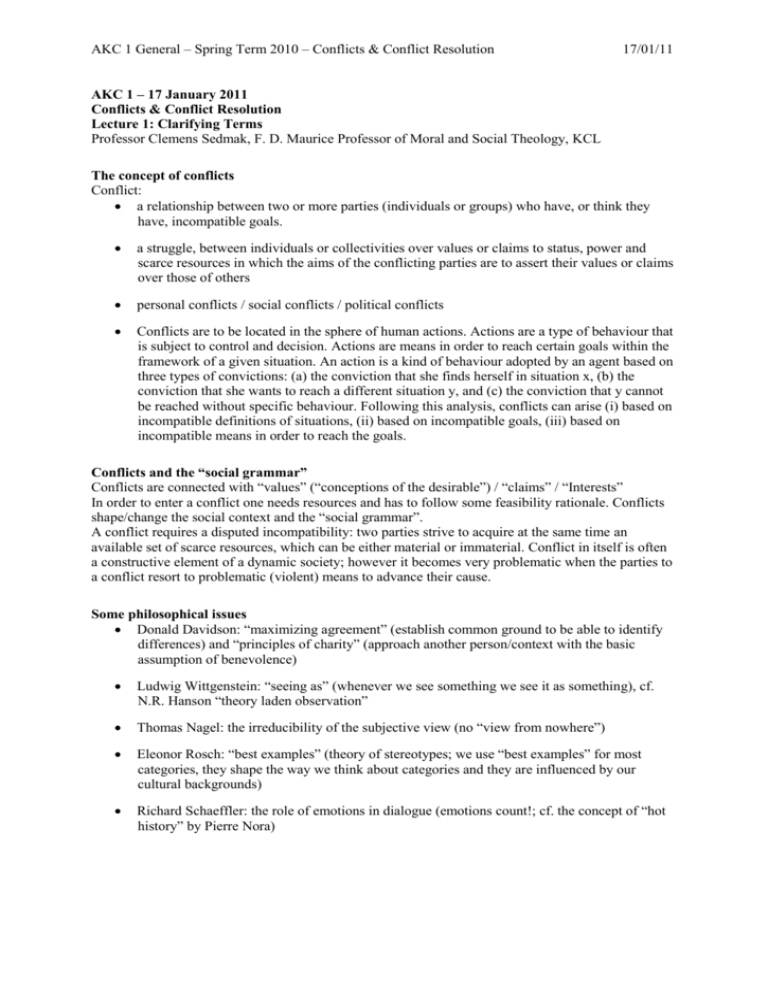
AKC 1 General – Spring Term 2010 – Conflicts & Conflict Resolution 17/01/11 AKC 1 – 17 January 2011 Conflicts & Conflict Resolution Lecture 1: Clarifying Terms Professor Clemens Sedmak, F. D. Maurice Professor of Moral and Social Theology, KCL The concept of conflicts Conflict: a relationship between two or more parties (individuals or groups) who have, or think they have, incompatible goals. a struggle, between individuals or collectivities over values or claims to status, power and scarce resources in which the aims of the conflicting parties are to assert their values or claims over those of others personal conflicts / social conflicts / political conflicts Conflicts are to be located in the sphere of human actions. Actions are a type of behaviour that is subject to control and decision. Actions are means in order to reach certain goals within the framework of a given situation. An action is a kind of behaviour adopted by an agent based on three types of convictions: (a) the conviction that she finds herself in situation x, (b) the conviction that she wants to reach a different situation y, and (c) the conviction that y cannot be reached without specific behaviour. Following this analysis, conflicts can arise (i) based on incompatible definitions of situations, (ii) based on incompatible goals, (iii) based on incompatible means in order to reach the goals. Conflicts and the “social grammar” Conflicts are connected with “values” (“conceptions of the desirable”) / “claims” / “Interests” In order to enter a conflict one needs resources and has to follow some feasibility rationale. Conflicts shape/change the social context and the “social grammar”. A conflict requires a disputed incompatibility: two parties strive to acquire at the same time an available set of scarce resources, which can be either material or immaterial. Conflict in itself is often a constructive element of a dynamic society; however it becomes very problematic when the parties to a conflict resort to problematic (violent) means to advance their cause. Some philosophical issues Donald Davidson: “maximizing agreement” (establish common ground to be able to identify differences) and “principles of charity” (approach another person/context with the basic assumption of benevolence) Ludwig Wittgenstein: “seeing as” (whenever we see something we see it as something), cf. N.R. Hanson “theory laden observation” Thomas Nagel: the irreducibility of the subjective view (no “view from nowhere”) Eleonor Rosch: “best examples” (theory of stereotypes; we use “best examples” for most categories, they shape the way we think about categories and they are influenced by our cultural backgrounds) Richard Schaeffler: the role of emotions in dialogue (emotions count!; cf. the concept of “hot history” by Pierre Nora) AKC 1 General – Spring Term 2010 – Conflicts & Conflict Resolution 17/01/11 Hans Georg Gadamer: role of “prejudice” (pre-judgment / prae-judicium as the ‘forestructures' of understanding, that is, in terms of the anticipatory structures that allow what is to be interpreted or understood to be grasped in a preliminary fashion); whenever we understand, we are involved in a dialogue that encompasses both our own self-understanding and our understanding of the matter at issue; the role of history and the role of language; the importance of an awareness of the hermeneutical situation - concept of ‘horizon’ (Horizont): understanding and interpretation thus always occurs from within a particular ‘horizon’ that is determined by our historically-determined situatedness; understanding as the ongoing process of “fusion of horizons”; basic model of understanding: conversation (involves an exchange between conversational partners that seeks agreement about some matter at issue; consequently, such an exchange is never completely under the control of either conversational partner, but is rather determined by the matter at issue). Prevention and Reconciliation Distinction: direct (“operational”, “light”: direct response to imminent crisis / structural (“deep”) / systemic (“measures to address global risk of conflict that transcend particular states” – Kofi Annan) “Conflict resolution”: umbrella terms that covers may different methods that can be used to resolve the conflict “reconciliation”: ‘… reconciliation can be seen as dealing with three specific paradoxes. First, in an overall sense, reconciliation promotes an encounter between the open expression of the painful past, on the one hand, and the search for the articulation of a long-term, interdependent future, on the other hand. Second, reconciliation provides a place for truth and mercy to meet, where concerns for exposing what has happened and for letting go in favour of renewed relationship are validated and embraced. Third, reconciliation recognises the need to give time and place to both justice and peace, where redressing the wrong is held together with the envisioning of a common, connected future” Lederach 1997, 20 “…to reconcile means to bring together that which belongs together but which is apart. It is the goal, the end term of the process we are describing, but it is frequently encouraged hastily and it is often pushed ahead before the time is right. Frequently, the rushing is equivalent to putting a Band-Aid on a wound before it is inspected and cleansed out” D. Donnelly, Reconciliation and Community. In: R. J. Kennedy, ed., Reconciliation: The Continuing Agenda. Collegeville, MN: Liturgical Press 1987, 34-42 39 Recommended books: Justice and Reconciliation: after the violence. Rigby, Andrew (2001). Building Peace: Sustainable Reconciliation in Divided Societies. Lynne Reinner: Boulder, Colorado; Lederach, John-Paul USIP Press, Washington DC, (1997). The AKC Examination will take place on Friday, 1st April between 14.30 and 16.30 AKC Exam Registration is live until 28th January 2011. Please login to your OneSpace Student Record to register mykcl.kcl.ac.uk . If you don’t wish to register for the exam, complete the Registration Task selecting “No“. You can still follow the lectures if you don’t take the exam. The AKC eLearning Pages are on your Blackboard with course code: NS-0ZDOAKC1-3 10~11 Associate of King’s College Full details about the AKC course, including the handouts: http://www.kcl.ac.uk/akc Please note the new AK C email address for queries akc@kcl.ac.uk or call internal ext 2333
